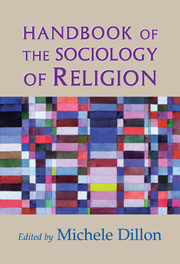Book contents
- Frontmatter
- Contents
- List of Contributors
- Acknowledgment
- Part One Religion as a Field of Sociological Knowledge
- Part Two Religion and Social Change
- Part Three Religion and the Life Course
- Part Four Religion and Social Identity
- Part Five Religion, Political Behavior, and Public Culture
- Part Six Religion and Socioeconomic Inequality
- 26 Religion, Faith-Based Community Organizing, and the Struggle for Justice
- 27 Latina Empowerment, Border Realities, and Faith-Based Organizations
- 28 “Worldly” or “Other Worldly”?
- References
- Index
26 - Religion, Faith-Based Community Organizing, and the Struggle for Justice
Published online by Cambridge University Press: 05 June 2012
- Frontmatter
- Contents
- List of Contributors
- Acknowledgment
- Part One Religion as a Field of Sociological Knowledge
- Part Two Religion and Social Change
- Part Three Religion and the Life Course
- Part Four Religion and Social Identity
- Part Five Religion, Political Behavior, and Public Culture
- Part Six Religion and Socioeconomic Inequality
- 26 Religion, Faith-Based Community Organizing, and the Struggle for Justice
- 27 Latina Empowerment, Border Realities, and Faith-Based Organizations
- 28 “Worldly” or “Other Worldly”?
- References
- Index
Summary
On May 2, 2000, three thousand people converged on the State Capitol in Sacramento, California. But this was not the usual frenzy of lobbyists serving the interests of the well-off, using the tools of well-oiled political action committees. Rather, these were working poor, working-class, and lower-middle income people lately referred to as “working families” and they went to Sacramento because they were tired of living on the verge of financial ruin or physical debility. Attendees were demanding adequate health coverage for people left out by current health care arrangements and they were angry about that, at a time when remarkable wealth was being accumulated all around them and California was running a $10 billion budget surplus.
The occasion was an “action” entitled “Healthcare for All Californians: Reweaving the Fabric of American Communities,” sponsored by the Pacific Institute for Community Organization (PICO). The day's event drew on recent academic research showing 1.5 million California children formally eligible for subsidized health coverage but still uninsured because of onerous inscription procedures, and a total of 7.3 million Californians uninsured, most relying on community clinics or emergency rooms for their medical care. The same research showed 82 percent of the uninsured to be members of working families, with nearly half headed by a family member working full time for all of 1999.
They packed the hall with a crowd approximately 40 percent Latino, 40 percent white, and 20 percent African American and Hmong.
- Type
- Chapter
- Information
- Handbook of the Sociology of Religion , pp. 385 - 399Publisher: Cambridge University PressPrint publication year: 2003
- 9
- Cited by

